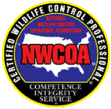
Call for Your Exclusive Wildlife Inspection Report.®
Skunk Removal
Skunks are easy to recognize, thanks to their distinctive black and white fur. However, what they’re most notorious for is their odor. When threatened, during mating season or sometimes, just randomly, they release a spray that contains sulfur-based organic compounds called thiols from their anus. This noxious scent is long-lasting and can even irritate the eyes.
Problems Associated with Skunks
Skunks are one of the most prevalent wildlife in suburban areas in the United States. In the Memphis area, in particular, there are so many that homeowners sometimes catch skunks in their traps when they intended to catch a cat or raccoon.
In their natural habitat, they live in dens, where they even huddle together when it’s cold. However, female skunks want somewhere safe, warm, and with an adequate food supply when they want to raise their young. Unfortunately, they have learned to reside with humans.
Here are some of the major problems they can cause for homeowners:
- Residing under the porch, deck, or shed.
- Air pollution from the appalling smell of their spray.
- Spraying or fighting with pets, usually dogs.
- Digging holes in the yard while they search for grubs.
- Damaging beehives, crops, golf courses, chicken coops, and more.
Removing Skunks from Under a Shed or Porch
Pregnant skunks usually give birth and raise their young under the shed or porch because of the safety and warmth it provides. This means that if you see an adult female skunk under your deck, she probably has her litter there too. So, you have to remove both the mother and her litter. Here’s how to do that.
Step 1: Search the entire perimeter of your home and locate all entry holes.
Step 2: Seal all the entry holes, but leave one open.
Step 3: Install a one-way exclusion device on the last opening or a proper-sized cage trap.
Step 4: Inspect underneath your shed, porch, or deck to bring out the babies. Make sure you wear your gloves.
Step 5: Relocate the entire family to a location that’s at least 10 miles away.
Step 6: Remove all the feces and decontaminate the entire space with an enzyme cleaner.
Step 7: Seal off the last hole.
Get Quote for Your Exclusive Wildlife Inspection Report.®



More Information on Skunk Trapping
It is important to note that the trapping, relocation, or euthanization of skunks is subject to state laws. While they may be successfully excluded, in some cases, the only viable option may be to trap them. With licensed wildlife professionals like Wildlife X Team Memphis, we can help you legally deal with your skunk problem.
Trapping is an art that requires a knowledge of skunk behavior to attain good results. But generally speaking, here’s how you go about it.
Step 1: Determine if trapping is the best course of action.
Step 2: From the dozens of skunk traps, select the appropriate one.
Step 3: Set the trap in the path most used by the skunk and make sure it’s well camouflaged with the surroundings.
Step 4: Use the appropriate bait. Examples include canned fish (like sardines), fresh insect larvae, crisp bacon, cat food, or bread with peanut butter.
Step 5: Monitor the trap daily so you can relocate it promptly.


More Information on Decontamination
Since skunk spray is very persistent, enzyme-based cleaners are needed to eliminate the organic matter and deodorize the space. It may not be 100% effective but it will drastically reduce the odor.
To decontaminate a space, mix 1 quart 3% hydrogen peroxide, 1/4 cup baking soda, and 1 teaspoon liquid soap. Use the solution immediately as the solution is unstable.
If your pet has skunk odor on it, bath or shampoo it thoroughly, then rinse it after 5 minutes. Repeat if the smell persists.
If the spray gets into your eyes, rinse it with water as soon as possible.
Conclusion
Dealing with skunks can be challenging. That’s why it’s best to leave it to the professionals at Wildlife X Team Memphis, where we handle the removal process from start to finish. If you are dealing with a skunk problem and live in the Memphis area, give us a call today!


